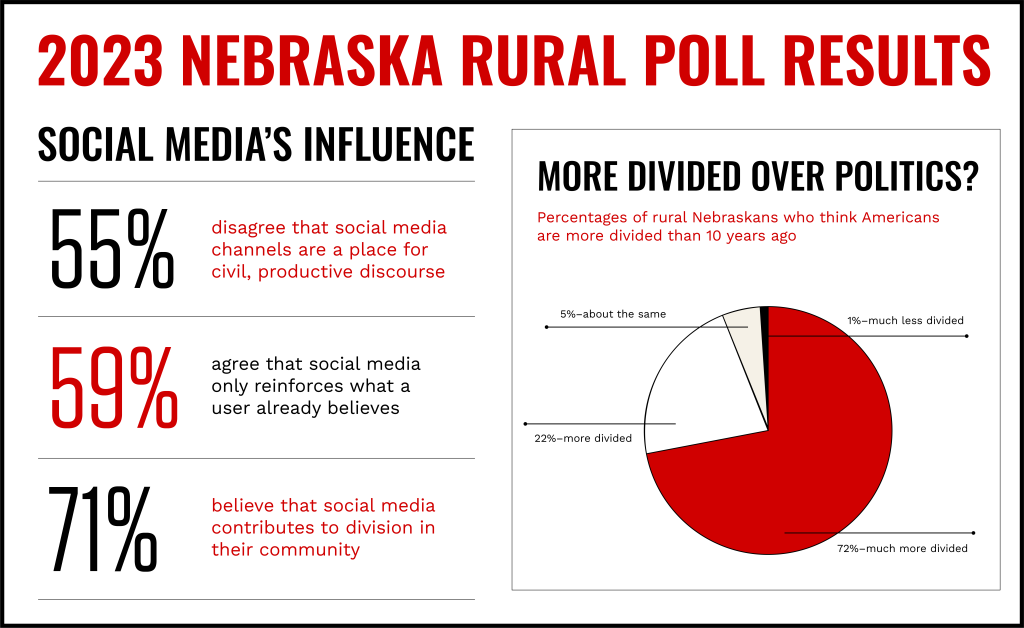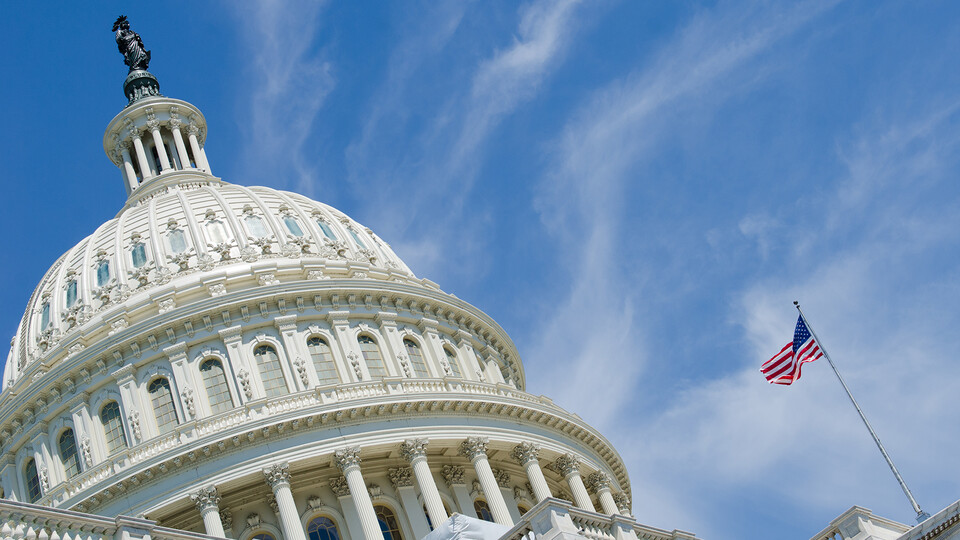Becky Vogt, October 16, 2023
Poll: Rural Nebraskans see lack of civility in politics as serious problem
Most rural Nebraskans see the lack of civil discourse in the political system as at least a somewhat serious problem, according to the 2023 Nebraska Rural Poll. About one-third of rural Nebraskans surveyed rate this lack of respectful discourse as either a very serious (32%) or somewhat serious problem (33%). Only 5% say it is not a serious problem.
This view may result from a perceived division in politics. Most respondents to the Rural Poll think Americans are more divided over politics than they were 10 years ago. Seventy-two percent believe Americans are much more divided, and 22% say Americans are more divided.
“A lack of civil discourse is a problem we are seeing across the country, and it’s possible this will get worse as we approach the 2024 national elections,” said Heather Akin, assistant professor in the University of Nebraska–Lincoln’s Department of Agricultural Leadership, Education and Communication. “But knowing what our communities are experiencing is an important first step to bring people together again.”
Political division can hinder efforts of leaders and citizens to get things done. When asked about how well local, state and national leaders overcome differences to accomplish things, rural Nebraskans surveyed have the most faith in local community leaders. Two-thirds believe community leaders do at least moderately well at overcoming differences. By comparison, 40% believe the same about Nebraska’s political leaders and only 9% believe the same about America’s political leaders. Even beyond their local leadership, most respondents (69%) also believe people in their local community as a whole do at least moderately well at overcoming differences to get things done.
“It’s not hard to find examples of political divisions playing out in state and national legislative bodies,” said L.J. McElravy, associate professor in the Department of Agricultural Leadership, Education and Communication. “The results reinforce just how palpable these divisions are for rural Nebraskans. The hard question is: What do we do about it? Finding opportunities to connect and collaborate across differing political ideologies seems to be as important today as it’s ever been.”

Political differences and civil discourse, or a lack thereof, are often seen on social media. Most rural Nebraskans surveyed have a negative opinion about social media and its impact on civil discourse. Fifty-five percent disagree that social media channels are a place for civil and productive discourse. And most agree that social media only reinforces what the user already believes (59%), and that it contributes to division in their community (71%).
Respondents have mixed opinions about whether social media platforms help them learn about a variety of opinions. Four in 10 disagree with that statement, while a similar proportion agree. Furthermore, more disagree that social media helps them feel engaged in their community (46%) than agree (31%).
“It was surprising to find that rural Nebraskans didn’t believe that social media helps them feel engaged in their community,” said Becky Vogt, the poll’s manager. “Many communities use social media to inform their residents of events or updates, so you would think that would make them feel more involved in the community. Perhaps the political arguments that may occur there have turned them off to social media altogether.”
Underscoring that point, the poll also found that more rural Nebraskans surveyed disagree than agree that people in their community are respectful toward others with differing political views. Forty-three percent disagree with the statement, while 27% agree.
“I think this issue also discourages people from running for office, because they are concerned for their mental and physical well-being due to attacks on various issues,” said Jamie Bright, a Rural Prosperity Nebraska Extension educator based in Kimball County. “We need to find ways to increase communication so fewer misunderstandings occur, and we can have respectful and productive discussions instead of shouting matches where both sides refuse to budge and nothing is accomplished.”
Poll results also showed that, overall, rural Nebraskans are positive about their communities. They rate them as friendly, trusting and supportive and say it would be difficult to leave. Most also have a positive attachment to their community, saying they have strong bonds and feel a sense of connectedness and belonging.
“It’s encouraging that many rural Nebraskans have confidence in their local officials to overcome differences and feel a sense of belonging and connection within their communities,” Akin said. “Building on this shared respect can help us find common ground and bridge divides.”
The Rural Poll is the largest annual poll gauging rural Nebraskans’ perceptions about policy and quality of life. Questionnaires were mailed to more than 6,000 households in Nebraska in late spring and summer, with 1,100 households — representing 86 of the state’s 93 counties — responding. The margin of error is plus-or-minus 3%. The University of Nebraska–Lincoln’s Department of Agricultural Economics conducts the poll with funding from Nebraska Extension. For the full report, click here.






